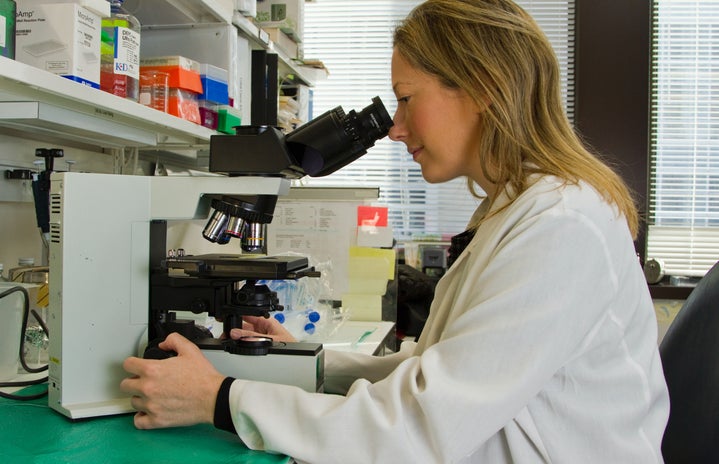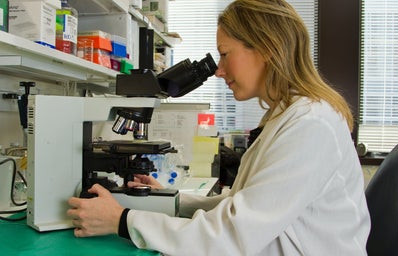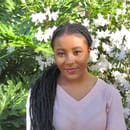Hopefully, we all know by now that global warming is very real and it’s something we should all be concerned about. Learning what we can do to preserve our environment is the first step in the right direction. For many of us, that step is probably recycling or maybe even biking to work, but for Marina Karki, it’s conducting research on the effectiveness of carbon capture. This study was conducted during the beginning of Karki’s junior year of high school. She is now finishing her second year at Rice University and reflects on the process of publication.
Her Campus (HC): For those who may not understand it, what exactly is your work about?
Marina Karki (MK): I worked on testing a new form of carbon capture that used micro resin beads and ion exchange to store carbon dioxide (CO2) from the atmosphere as bicarbonate. I wanted to see the effectiveness of the new technology and try to design how it could be used to remove CO2.
HC: What does carbon capture do for the environment?
MK: Carbon capture works to remove and store all the excess carbon dioxide we have in the atmosphere; excess CO2 helps promote the warming of the atmosphere as it stores energy from the Sun. The process of global temperature warming can lead to a variety of environmental issues, like sea ice melting, sea-level rise and coral bleaching. Carbon capture can help remove that excess CO2 and prevent any of these negative consequences.

HC: That seems like it could be very time-consuming. How long was the actual research process?
MK: It actually was not that bad! It took a little less than a year to finish all of the actual research. I started developing the project in March or April of that year (2018) and ran testing until about December of the same year.
HC: Okay, so not that bad. How long did it take you to finish your work?
MK: I actually continued to expand upon the project and research for another year or so after my junior year. During that same year, I also worked on putting together my report and editing it as needed to submit it for publication in 2020.
HC: Was this a process you endured alone or were there others who helped? How many?
MK: There were parts of the process that I endured alone and parts where I was helped by others. My high school experimental science teacher would often give me advice or let me bounce ideas off him when I hit a wall in my research. His feedback was very helpful, and I appreciate him for that. My parents also helped in any way they could with testing my experiment. Even if it was just for emotional support, they were there for me (love you guys)! However, it was definitely a specialized field research project, so the people around me didn’t always have the knowledge or expertise to help me with things like the logistics of the experiment. For that stuff, I had to rely on myself.

HC: Gotta love supportive parents! Was it important for you to get published? Why or why not?
MK: I think it was important to me personally. I don’t think my work really “needed” to be published; it was just something that I wanted to do. It felt like a stamp of validation for all the hard work I put into this experiment and justified the countless hours I had spent working on it. I am extremely proud of myself and what I accomplished, and I know others are proud of me as well. I feel like having these people proud of me also makes all of this worth it.
HC: Do you think being published in high school is the same or different from being published in any higher education?
MK: You know, I’m not really sure. High school research, at least in my experience, is definitely more of an individual experience than I think research in higher education is. The validation that comes from publication in high school I think feels different than the validation from higher education publication because of this. Publication in higher education is honestly somewhat normal, especially in a STEM majored education. A lot of senior projects are publishing your work.
HC: What’s one thing you wish you knew when going through the publication process?
MK: If I could tell myself one thing, it would be to know that this is a long and hard process, but you have to be persistent in accomplishing your goals. Publishing your paper sometimes is just as hard as doing the actual experiment, so just like when doing research, you need to take failure in stride and keep moving forward. Don’t let those setbacks get to you.
HC: I think that’s some advice we could all use! Why should everyone know about carbon capture?
MK: Although it is not the solution to all of our environmental issues with carbon dioxide, it’s another avenue to help the issue at hand. Advancements in technology are fascinating and are part of the future of environmental science. Ultimately, however, people and how they choose to approach these issues will be the ones to make the real difference in our environment.
Be sure to check out Karki’s work to learn more about the effectiveness of carbon capture!
Want to see more HCFSU? Be sure to like us on Facebook and follow us on Instagram, Twitter, TikTok, Youtube and Pinterest!


